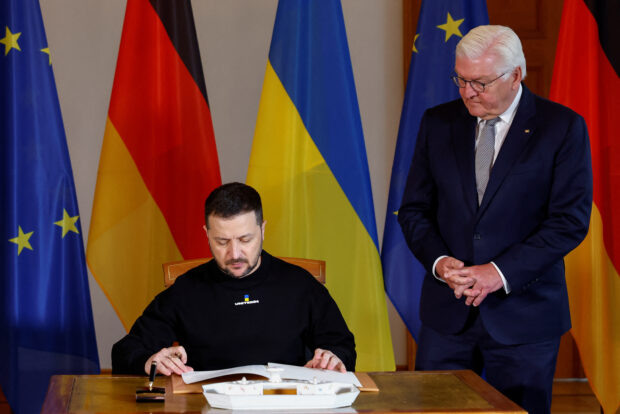Zelenskiy in Berlin: We can make Russia’s defeat ‘irreversible’

Ukrainian President Volodymyr Zelenskiy signs the Golden Book as German President Frank-Walter Steinmeier looks on at Bellevue palace in Berlin, Germany, May 14, 2023. REUTERS/Michele Tantussi
KYIV/BERLIN — Ukrainian President Volodymyr Zelenskiy said Sunday that Kyiv and its Western supporters could make a Russian defeat in the war in Ukraine “irreversible” as early as this year and thanked Germany for being a “true friend” during a visit to Berlin.
Zelenskiy secured a large military boost on his visit, with the German government announcing a 2.7 billion euro ($3 billion) of military aid to Ukraine on Saturday, its biggest such package since Russia’s invasion in February last year.
“Now is the time for us to determine the end of the war already this year, we can make the aggressor’s defeat irreversible already this year,” he said during a joint news conference with German Chancellor Olaf Scholz.
READ: How will it end? No easy answers over Russia’s war on Ukraine
Scholz, meanwhile, underscored Germany’s pledge to continue to support Ukraine for as long as necessary, brushing aside a question about earlier tensions in bilateral relations and side-stepping another question about Kyiv’s hopes to join NATO.
Germany, which is Europe’s largest economy, faced criticism at the start of the war for what some called a hesitant response, but it has become one of Ukraine’s biggest providers of financial and military assistance.
Ukraine is expected to launch major counter-offensive operations in the coming weeks to try to recapture tracts of its east and south from Russian forces.
On his first visit to Germany since the Russian invasion began, Zelenskiy said Kyiv was prepared to discuss outside peace initiatives from other states but that those proposals should be based on Ukraine’s position and its peace plan.
READ: Ukraine’s Zelensky says Russia trying to ‘wipe us off the face of the earth’
“The war is happening on the territory of our country and so any peace plan will be based on Ukraine’s proposals,” he said, wearing his trademark khaki combat trousers and a black sweater.
Kyiv has ruled out the idea of any territorial concessions to Russia and has said it wants every inch of its land back. Russia annexed the Crimean peninsula in 2014 and since last year has claimed to have annexed four other Ukrainian regions, which Moscow now calls Russian land.
“Ukraine is ready for peace. But it demands, rightly and with our support, that this cannot mean to freeze the war and have a form of dictated peace by Russia,” said Scholz.
Past tensions
Zelenskiy met on Saturday with Italian Prime Minister Giorgia Meloni and Pope Francis. He is seeking to shore up support from Ukraine’s financial and military backers as they contend with a growing cost of living crisis at home.
Zelenskiy left open the prospect of a “risk that if the (counter)offensive is not very successful that there will be less support, but I don’t think this is the general view”.
READ: February 24, 2022: the day Russia invaded Ukraine
“There are some countries that are thinking about it, but I don’t think they’ve been very strong in their support for Ukraine throughout this period,” he added, without specifying which countries could waver in their backing for Ukraine.
Zelenskiy visited Germany for the Munich Security Council in February last year, just before the war broke out. Germany was constrained in its support for Ukraine at that time both by its energy dependence on Russia and the pacifism that emerged from its bloody 20th century history.
Increasing its support required a major policy upheaval and a shift in mindset that Scholz dubbed a “Zeitenwende”, or turn of era, in a landmark speech just days after the war broke out.
Zelenskiy flew to Berlin on a German government plane escorted over German airspace by fighter jets of the Luftwaffe air force, arriving in the middle of the night.
READ: Four Russian military aircraft shot down near Ukraine, Russian daily reports
He was expected to travel on Sunday afternoon to Aachen in west Germany to receive the prestigious Charlemagne prize in honour of services to Europe.
The Ukrainian people, under Zelenskiy’s leadership, are fighting not only for their country “but also Europe and European values”, the prize committee said in a statement.